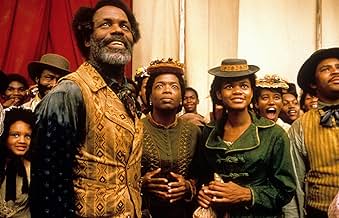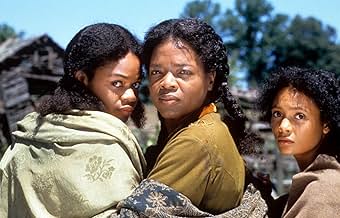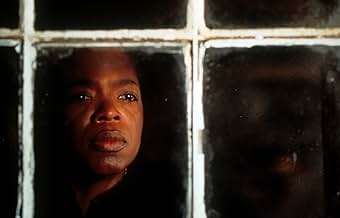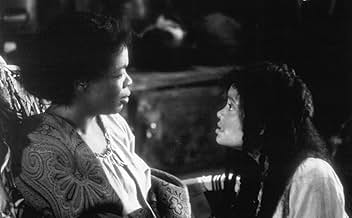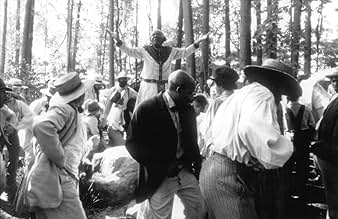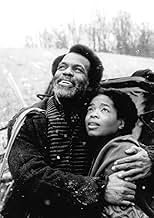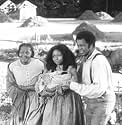Beloved
IMDb RATING
6.1/10
9.9K
YOUR RATING
A slave is visited by the spirit of a mysterious young woman.A slave is visited by the spirit of a mysterious young woman.A slave is visited by the spirit of a mysterious young woman.
- Nominated for 1 Oscar
- 3 wins & 24 nominations total
Kessia Embry
- Amy Denver
- (as Kessia Kordelle)
LisaGay Hamilton
- Younger Sethe
- (as Lisa Gay Hamilton)
Thandiwe Newton
- Beloved
- (as Thandie Newton)
Featured reviews
Beloved is one of the best movies of the last decade. I have read many, many reviews which seem to have been written by those who have little to no idea of just how complex and difficult Toni Morrison's original novel can be. Of course Beloved (the movie) will be long, and of course it will be emotionally draining and even confusing - the book was! That said, I loved the novel and the film version of it, which follows the original material almost verbatim. (To try and change the story would be to tamper needlessly with a Pulitzer and Nobel Prize-winning book). I am no Oprah nut but she obviously had a deep respect and understanding for the story, which is evident in her surprisingly understated acting. Thandie Newton was simply amazing; I am glad I watched the film if for nothing else than the chance to see her performance (which, to be honest, has helped a key facet of the book make sense for me). The production design is flawless, and, as always, Jonathan Demme proves he's more than above average as a director. If you like pulp trash and want your movies dumb, loud, and shallow, avoid the movie version of Beloved. But if you're looking for a magnificently acted and gorgeously produced film, see this movie the first chance you get. I'm very glad I did.
Famous feminist writer, Toni Morrison, deserved to win a Pulitzer Prize for her historical novel that represents Black American's struggles with slavery and freedom.
How anyone, let alone hundreds of voters here, could rate this marvelously directed & performed film a 1 is beyond me. Oprah Winfrey is the leading lady of the cast who ultimately demonstrates what is an Oscar-entitled performance.
Sethe, the character Winfrey plays is one of the most complex & challenging ones that I can imagine for any actor to take upon themselves. In fact, Winfrey stayed so true to her character, in my mind, she became Sethe: a former slave mother, a million & a half miles away from a Oprah the billionaire guest show host in Chicago! Danny Glover also gave a grand performance that was equally far from any other role I've seen him play. He & Winfrey together are a fine big screen match who I hope are in movies with Pulitzer prize winning plots as thick as is this one.
How anyone, let alone hundreds of voters here, could rate this marvelously directed & performed film a 1 is beyond me. Oprah Winfrey is the leading lady of the cast who ultimately demonstrates what is an Oscar-entitled performance.
Sethe, the character Winfrey plays is one of the most complex & challenging ones that I can imagine for any actor to take upon themselves. In fact, Winfrey stayed so true to her character, in my mind, she became Sethe: a former slave mother, a million & a half miles away from a Oprah the billionaire guest show host in Chicago! Danny Glover also gave a grand performance that was equally far from any other role I've seen him play. He & Winfrey together are a fine big screen match who I hope are in movies with Pulitzer prize winning plots as thick as is this one.
I found it difficult to understand the movie, and some of the dialogue, but it mattered little. I wish I'd read the book--perhaps I will, but I don't think so. A film must stand by itself, or it is not a film.
"Beloved" has long passages of greatness. First, it contains one of the best and most fascinating performances I've seen in years, given by Thandie Newton. She spent most of "Gridlock'd" in a coma, unfortunately, and that's the most notable role she's had until this one. Her first speaking (if you'll call it that) line is gripping, frightening, and amusing, and she plays a mental defective in a manner which I've never seen before. She has the loudest, rudest character, and many actresses would be put off by some of the things she must do throughout the film. However, our attention is also held by her quiet moments, as well as a few shots where the camera is content to gaze tranquilly into her beautiful eyes.
That camera is conducted with the supreme artistry of one of my favorite photographers, Tak Fujimoto, who was with director Jonathan Demme since the late '70s. Fujimoto is in love with earth and flesh tones here, but he also shoots his actors' eyes as if they were a part of the human body we'd never really noticed before, and wanted to give them the attention they deserved. It's a great approach to cinematography that pays off an infinite number of times, from the first major shot, of Sethe and Paul D reuniting (as Winfrey and Glover look at each other, they look not just into the camera, but directly into OUR eyes), to the last major shot, Jason Robards (God love him) staring in horror at a most unusual scene in front of Sethe's home.
This film is no "The Color Purple", with Welles-influenced camera angles and sacchirine-induced uplift. "Beloved" is a long, difficult, often off-putting film which doesn't really provide the big payoff at the end. This isn't necessarily good, but it isn't necessarily bad, either. Highlighted sequences include two truly remarkable sermons in the woods by Baby Suggs (Beah Richards--Oscar-nominated in '68 for "Guess Who's Coming to Dinner?"), a horrifying opening which features the most gruesome use of animatronics to date, and the notorious flashback which explain what has haunted Sethe all these years, and who Beloved really is.
I compare this film with "The Thin Red Line". Both come from notable directors, are based on famous novels, used huge budgets, and were very long. Both films disappointed many, many people. Most importantly, however, they both had parts which were greater than the whole, occasional strokes of genius, and were made by men who took the art of filmmaking seriously.
"Beloved" has long passages of greatness. First, it contains one of the best and most fascinating performances I've seen in years, given by Thandie Newton. She spent most of "Gridlock'd" in a coma, unfortunately, and that's the most notable role she's had until this one. Her first speaking (if you'll call it that) line is gripping, frightening, and amusing, and she plays a mental defective in a manner which I've never seen before. She has the loudest, rudest character, and many actresses would be put off by some of the things she must do throughout the film. However, our attention is also held by her quiet moments, as well as a few shots where the camera is content to gaze tranquilly into her beautiful eyes.
That camera is conducted with the supreme artistry of one of my favorite photographers, Tak Fujimoto, who was with director Jonathan Demme since the late '70s. Fujimoto is in love with earth and flesh tones here, but he also shoots his actors' eyes as if they were a part of the human body we'd never really noticed before, and wanted to give them the attention they deserved. It's a great approach to cinematography that pays off an infinite number of times, from the first major shot, of Sethe and Paul D reuniting (as Winfrey and Glover look at each other, they look not just into the camera, but directly into OUR eyes), to the last major shot, Jason Robards (God love him) staring in horror at a most unusual scene in front of Sethe's home.
This film is no "The Color Purple", with Welles-influenced camera angles and sacchirine-induced uplift. "Beloved" is a long, difficult, often off-putting film which doesn't really provide the big payoff at the end. This isn't necessarily good, but it isn't necessarily bad, either. Highlighted sequences include two truly remarkable sermons in the woods by Baby Suggs (Beah Richards--Oscar-nominated in '68 for "Guess Who's Coming to Dinner?"), a horrifying opening which features the most gruesome use of animatronics to date, and the notorious flashback which explain what has haunted Sethe all these years, and who Beloved really is.
I compare this film with "The Thin Red Line". Both come from notable directors, are based on famous novels, used huge budgets, and were very long. Both films disappointed many, many people. Most importantly, however, they both had parts which were greater than the whole, occasional strokes of genius, and were made by men who took the art of filmmaking seriously.
READ THE BOOK, PEOPLE, READ THE BOOK! The book helped me understand the film and the film helped me understand the book. This is an amazing piece of work. Winfrey gives a moving and observant performance and Thandie Newton is startling. Some scenes are intense, making you think whether you would kill your child. I didn't notice any gliches and I think the film screams for Oscars. I think this whole slave movie thing going on is getting boring but when they are made with such power and great directing and acting, I praise God for it! Demme gives us one of the most touching ghost stories and certainly the strangest, in a while.
Beloved the movie seeks to rival Beloved the novel in telling the African-American story. While it could not attempt to capture all of the richness of Morrison's great novel, it does do what it can in the constraints of a feature movie. The performances are phenomenal, and any Oscar nominations will be well deserved. The Ohio/Kentucky background takes one's breath away and the movie really does grip its viewer during key scenes
However, Morrison's non-linear style did not translate as well on the big screen and the flashbacks are truly confusing at points. Moreover, the movie has about three natural climaxes which heighten the viewer's awareness of the length of the movie.
All told, it is a good movie, but it is not a must-see movie, nor will it have the cultural impact Oprah intended.
(As for no likeable white characters which some posts have charged, first Mr. Baldwin is a likeable white person. Second, in a post-slavery society of Ohio/Kentucky, why do there have to be any good whites in this narrow world? Oh yeah, don't be mad at Oprah for that--Morrison didn't include any in her book either)
However, Morrison's non-linear style did not translate as well on the big screen and the flashbacks are truly confusing at points. Moreover, the movie has about three natural climaxes which heighten the viewer's awareness of the length of the movie.
All told, it is a good movie, but it is not a must-see movie, nor will it have the cultural impact Oprah intended.
(As for no likeable white characters which some posts have charged, first Mr. Baldwin is a likeable white person. Second, in a post-slavery society of Ohio/Kentucky, why do there have to be any good whites in this narrow world? Oh yeah, don't be mad at Oprah for that--Morrison didn't include any in her book either)
Did you know
- TriviaThandiwe Newton's African first name means, interestingly enough, "beloved."
- GoofsIn the scene with a deer in the field, a car is visible driving by in the upper right hand corner.
- Quotes
Baby Suggs: And the beat, beat, of your heart... Love it. More than the lungs that need yet to breathe free air. More than the womb, which holds life. More than the private parts that give life. Love your heart. This... this is the prize. Amen. This the prize... Amen!
- Crazy creditsIn lieu of traditional opening credits, the movie begins with the camera moving through a cemetery to focus on a gravestone engraved with the sole word "BELOVED".
- Alternate versionsIn the version aired on television there is a deleted scene and two alternate scenes. The TV version also removes any mention of Sethe's sons. They don't exist in the TV version. The first alternate scene is when Paul D is telling Sethe about Halle being in the loft. In the theatrical you see Paul D quoting Halle. In the TV version there is a flashback to Halle (Hill Harper) saying "The loft." The second alternate scene in the prayer group discussing how to deal with Sethe being haunted by Beloved. In the theatrical there is a line about Sethe being like batter. In the Tv version that is removed and there is a line inserted from another woman saying "I don't mind a little communication between worlds but this is invasion" and another character says "we better get to work and pray" The deleted scene added for the TV version has Stamp Paid asking Paul D if beloved is his problem and not what Sethe did.
Details
Box office
- Budget
- $80,000,000 (estimated)
- Gross US & Canada
- $22,852,487
- Opening weekend US & Canada
- $8,165,551
- Oct 18, 1998
- Gross worldwide
- $22,852,487
- Runtime
- 2h 52m(172 min)
- Color
- Sound mix
- Aspect ratio
- 1.85 : 1
Contribute to this page
Suggest an edit or add missing content


